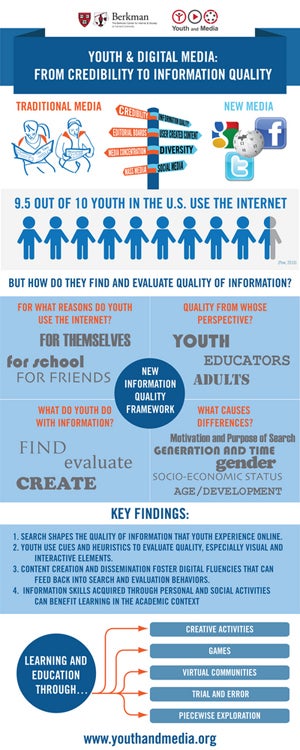As youth increasingly turn to the Internet as a source of information, researchers, educators, parents, and policy-makers are faced with mounting challenges and opportunities. A new report from Harvard’s Youth and Media project at the Berkman Center for Internet & Society seeks to understand youths’ real experiences of online information quality.
The report, “Youth and Digital Media: From Credibility to Information Quality,” synthesizes more than three years of research by Berkman’s Youth and Media team. The report, written by Urs Gasser, executive director of the Berkman Center, Berkman Fellow Sandra Cortesi, and Research Assistants Momin Malik and Ashley Lee, was released in February.
Building upon a process- and context-oriented information quality framework, the report seeks to map and explore what is known about the ways in which young people, ages 18 and under, search for information online, how they evaluate information, and how their related practices of content creation, levels of new literacies, general digital media usage, and social patterns affect these activities.
A review of selected literature at the intersection of digital media, youth, and information quality—primarily works from library and information science, sociology, education, and selected ethnographic studies—reveals patterns in youth’s information-seeking behavior, but also highlights the importance of contextual and demographic factors both for search and evaluation. To access the full report and additional material, please visit: http://youthandmedia.org/publications/
Key Findings:
1. Search shapes the quality of information that youth experience online.
2. Youth use cues and heuristics to evaluate quality, especially visual and interactive elements.
3. Content creation and dissemination foster digital fluencies that can feed back into search and evaluation behaviors.
4. Information skills acquired through personal and social activities can benefit learning in the academic context.
“Youth and Digital Media: From Credibility to Information Quality” lays the foundation and raises questions for further explorations in this area. The report—which builds upon research enabled by generous grants from the John D. and Catherine T. MacArthur Foundation and the Robert R. McCormick Foundation—also encourages a public policy discussion on youth, digital media, and information.
